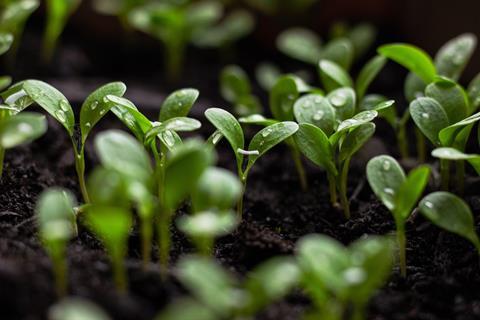This World Soil Day, Applied Microbiology International turns the spotlight on some of the tiniest yet key promoters of soil health - its microbiota.
World Soil Day (WSD) is held annually on 5 December as a means to focus attention on the importance of healthy soil and to advocate for the sustainable management of soil resources.

Land has a wide variety of uses: agricultural, residential, industrial, and recreational. Unfortunately, a growing population on earth has led to unsustainable use of land on earth through deforestation, land degradation and loss of natural habitats. Microbes play a key role in the terrestrial ecosystem, providing symbiotic relationships with plants and animals alike. Human use of land has led to the exhaustion of nutrients in soils, contamination of land, and a reduction in biodiversity.
PROMOTED: AMI has teamed up with QIAGEN to help you get the highest yields from your soil DNA Extractions. Get your free guide here.
Microbes provide a powerful tool to tackle many of these issues, such as dealing with contaminated water and soils through bioremediation and restoring nutrients to soils. Applying our knowledge of microbes will be essential in restoring the biodiversity of affected ecosystems.
Developing understanding
Earlier this year, AMI launched its Healthy Land Advisory Group, which ties in with UN SDG 15 – Life on Land.
This team of microbiologists will bring their expertise to bear on exceptional areas that are currently lacking in terms of how applied microbiology can contribute to UN SDG 15.
Greater research into the microbiomes present on land is essential, as this will allow researchers to develop strategies to protect these invisible networks which support a healthy environment. Understanding how microbes impact human life on land could all have a positive impact, by increasing crop production, repurposing areas of land and improving microbial biodiversity in soil, land, and water.
Experts together
AMI recently hosted a small event, The Power of Microbes in Sustainable Crop Production at the John Innes Centre, the heart of crop and soil microbiology research, gathering experts in the field to discuss all the latest issues surrounding healthy land, food production and the role soil plays in this.
We were thrilled to hear from Yvonne Pinto, Thomas Bell, Fiona Brennan and Leo van Overbeek with discussions in the afternoon about the major issues we face, and how microbiology can support this important work. One of the major outcomes was a lack of education surrounding soil, and why healthy soil is imperative to healthy crops, healthy animals and humans.
Meanwhile, our webinar series launching next year will include a least one topic around soil microbiology - keep an eye on our events page for more information.
Prestigious awards
Soil science is also given its rightful place in the AMI Horizon Awards, with the Dorothy Jones Prize awarded to a scientist who has used microbiology to make a significant contribution to our understanding of terrestrial life, rhizospheres and soil microbiomes, or to the preservation of our global ecosystem.
The winner this year was Distinguished Professor Brajesh Singh of Western Sydney University, a global expert in the field of microbial functional ecology who spent ten years honing his knowledge in Scotland before relocating to Australia and joining Hawkesbury Institute for the Environment, becoming Director of the Global Centre for Land-Based Innovation in 2015.
Meanwhile the winner this year of our Applied Microbiology International Product of the Year is Uttam Superrhiza, a mycorrhiza biofertilizer marketed by Chambal Fertilizers and Chemicals Limited in India, and manufactured by the not-for-profit institute, The Energy and Resources Institute (TERI).
Journal launch
This year, we launched our new journal, Sustainable Microbiology, which brings together content from scientists, policy makers, practitioners and industry, to demonstrate the application of microbiology in achieving the UN Sustainable Development Goals (UN SDGs).
Reflecting the importance of this study area, soil microbiology is strongly represented on the Sustainable Microbiology Editorial Board by Editor-in-Chief David Pearce, Consulting Editor Jim Lynch and Associate Editors Don Cowan and Carsten Suhr Jacobsen.
We are keen to receive submissions on soil science and soil’s role in wider environmental systems and sustainable land management and agriculture.
Find out more about the journal and submissions here: https://academic.oup.com/sumbio/pages/about
Teaming up
AMI is committed to partnering with educational bodies, research institutes and businesses who are tapping into the power of microbes to supporting UNSDG15.
We have just started working with leading assay developer QIAGEN to bring our community the latest information on improving microbial DNA extraction from soil samples, Download your free copy of the guide today.
To find out more about how you can partner with AMI, reach out to Josie Harris on josie@appliedmicrobiology.org
If AMI sounds like a soil microbiology community that intrigues you, find out more about signing up as a member today.







No comments yet